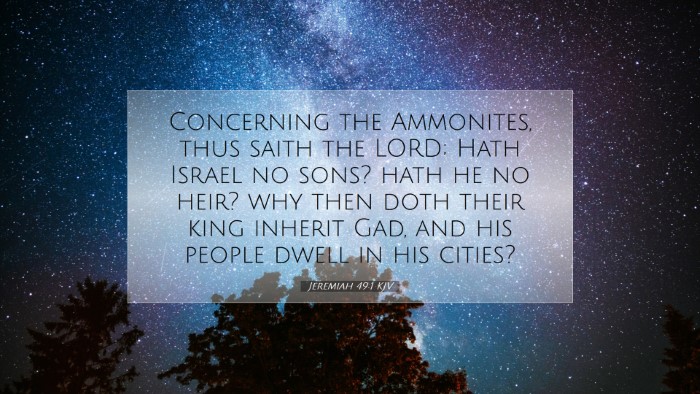Commentary on Jeremiah 49:1
Verse Reference: Jeremiah 49:1 - "Concerning the Ammonites, thus says the Lord: Has Israel no sons? Has he no heir? Why then has Milcom taken possession of Gad, and his people settled in its cities?"
Contextual Background
The prophecy concerning the Ammonites is set within the broader context of God's judgment against the nations surrounding Israel. The Ammonites, descended from Lot, had historically been in conflict with Israel. This oracle illustrates not just the fate of the Ammonites but also highlights the covenant relationship between God and Israel.
Theological Insights
- Divine Judgment: This verse opens up a discussion on the theme of divine judgment against those who oppose God’s people. The use of Milcom, the Ammonite deity, indicates a misplaced trust and the folly of idolatry.
- Covenant Identity: The rhetorical question posed by the Lord emphasizes Israel's status as God's chosen nation. The implications of not having heirs point to a deeper spiritual barrenness resulting from idolatry and moral decline.
- God's Sovereignty: This passage exemplifies God's supremacy over all nations. The mention of Milcom taking possession highlights the false security that comes from relying on idols rather than the living God.
Commentary Insights
Matthew Henry’s Commentary
Matthew Henry focuses on the irony present in the inquiries concerning Israel's lineage. He points out that the Ammonites were encroaching on land that rightfully belonged to Israel, which serves as a metaphor for their defiance against God’s sovereignty. Henry emphasizes that God’s assurances to Israel include protection from such foes, and His anger against them is a reminder of His omnipotent care for His people.
Albert Barnes’ Notes on the Bible
Barnes highlights the unexpected question, "Has Israel no sons?" indicating that the Ammonites' actions reflect both their overreach and a misunderstanding of Israel's status. He notes that the question serves to chastise the Ammonites for their prideful invasion of Gad’s territories. This passage, he argues, not only speaks of temporal consequences for nations but also reflects the eternal truth of God's faithfulness to His covenant.
Adam Clarke's Commentary
Clarke delves into the cultural and historical implications of Gad's inheritance. He points out that the Ammonites’ displacement of Gad is an affront to God’s order. Clarke elucidates that these verses serve as both a warning and a declaration. The Ammonites have overstepped their boundaries, and in their quest for prosperity through conquest, they face inevitable judgment from the Lord. The mention of Milcom is indicative of their disloyalty to the Creator.
Application for Today’s Readers
This verse presents several reflections for pastors, students, theologians, and scholars:
- Understanding Modern Idolatry: Just as the Ammonites worshiped Milcom, modern individuals often place their trust in contemporary ‘gods’—whether they be materialism, fame, or power. This prompts a reassessment of where our ultimate allegiance lies.
- Faithfulness amid Adversity: The assurance that God remains sovereign even when challenges arise can encourage believers facing societal pressures that threaten their faith and identity.
- Emphasis on Covenant Relationships: Reflecting on one’s identity in Christ is paramount. This verse calls believers to recognize their standing as heirs in the family of God and the responsibilities that accompany that privilege.
Conclusion
Jeremiah 49:1 serves as a powerful reminder of God's protection over His people and the futility of opposing His plans. Through the insights from notable commentaries, we grasp the richness of this text in revealing the character of God and the inherent challenges faced by His covenant community.


